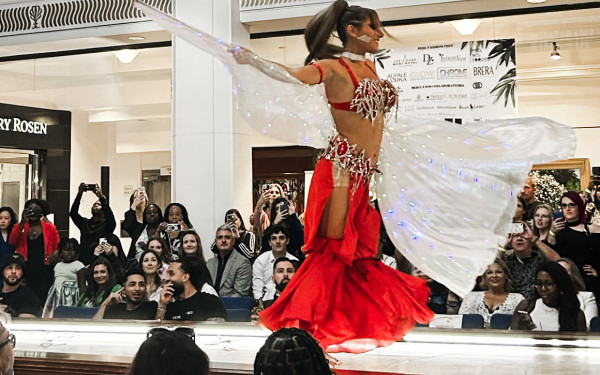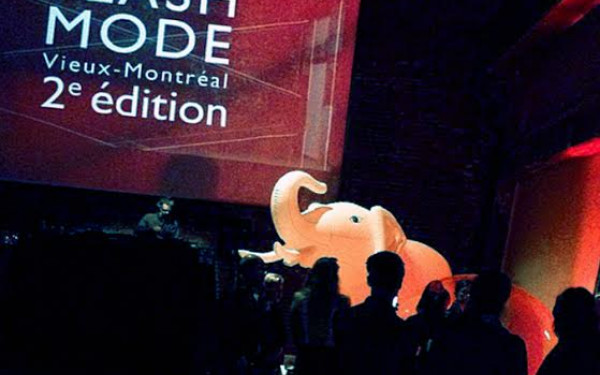Stylishly Underfunded
Montreal’s Fashion Scene Declines Steadily as Young Designers Pack Up and Leave
After organizers canceled the Toronto Fashion Week in July due to a lack of funding, it’s starting to look like Canada’s last hope of impacting the fashion world has vanished.
Montreal’s own fashion week was cancelled in 2013 for the same reason. Without a weeklong showcase of what our local designers have to offer, the future of fashion here is looking bleak.
As a fashion blogger and stylist for the last five years, I’ve watched the decline of the Canadian industry in real time. Naturally, young designers who were just starting out couldn’t afford the high costs of showcasing their work at Montreal Fashion Week—leaving the shows to be dominated by older creators with less adventurous clientele.
By placing the showcase beyond the reach of Montreal’s up and coming designers, their work lacked a platform from which they could find buyers, and more importantly—exposure. These lesser-known creators had the added pressure of having to deal with marketing, without the help of their city and province’s fashion industry.
According to local designer Markantoine Lynch-Boisvert, the young creative behind the label MARKANTOINE—and someone I’ve worked with in the industry—the audience is there, but the money isn’t.
“It’s easy in Montreal to become appreciated or recognized as a designer—in the sense that we’re considered artists—that we showcase a dream, works of art,” Lynch-Boisvert said.
“Why works of art? Because rare are those that will actually buy.”
Lynch-Boisvert believes that Quebec’s designers are restricted to traditional forms, colours and styles, and if a label strays from the basic formula, it becomes difficult to make any sales.
Without any money coming in, young designers are forced to either pack up or go to the U.S., where there’s a real market for fashion, or give up their dreams of being successful designers.
It’s widely known that Montreal is full of creative talents who are ready and willing to change the face of the Canadian fashion scene, but finding a client base is the real challenge.
Some blame mega-stores like H&M, Aritzia, and Urban Outfitters for running out smaller independent boutiques, while others blame the seemingly never-ending construction on popular shopping streets like St-Denis and St-Laurent. Both reinforce the likelihood that a shopper will just find the nearest Old Navy or Forever 21, forcing independent stores to close their doors for good.
Kristina Spino, a concept designer at Dynamite Group who’s been involved in Montreal’s fashion industry for over a decade, says the influx of foreign giants like Zara and H&M have led to the demise of small retailers.
“I remember being able to walk down the streets of St-Denis when it had cool fashion boutiques like Juan & Juanita and Stoopid,” she said. “We saw many Montreal-made retailers shut their doors back in 2015, which left the city with fewer options to shop and in effect Montreal lost its uniqueness, which is what we were known for in the fashion industry.”
Jes Nudo, a manager at Kika Marketing and editor-in-chief at DCMTL Blog and Nudabite, believes that the lack of support for young designers can also be blamed on an atmosphere resistant to change.
Although she believes the city is an “ecosystem of style trailblazers, creators and creative minds,” she also thinks a serious lack of funding has played a big role in the decline of emerging brands.
“It’s 100 per cent related, and it’s about time that people woke up to this reality,” she said.
Despite the seemingly hopeless state of Montreal’s fashion industry, there is a silver lining.
When Sensation Mode decided to cancel the city’s bi-annual media-only fashion week, they also announced the creation of Festival Mode & Design—an event open to the public that would allow everyone to see the work of the city’s designers in a public space. The festival would be separated into two stages—the larger one reserved for household names such as Dynamite, Ardene, La Vie En Rose, Reitmans and Forever 21, and the smaller one to promote the city’s lesser known brands. While the festival gets bigger every year and more start up designers are being featured, its impact on the city’s fashion industry as a whole has yet to be seen.
Montrealers have an undeniable reputation as leaders in style within the country—but due to lack of government funding, an overall unwillingness to support change, a complicated political atmosphere and a population that is refusing to spend on anything other than fast fashion, it’s hard to say what will come of all this seemingly wasted talent.




_600_375_s_c1.png)
